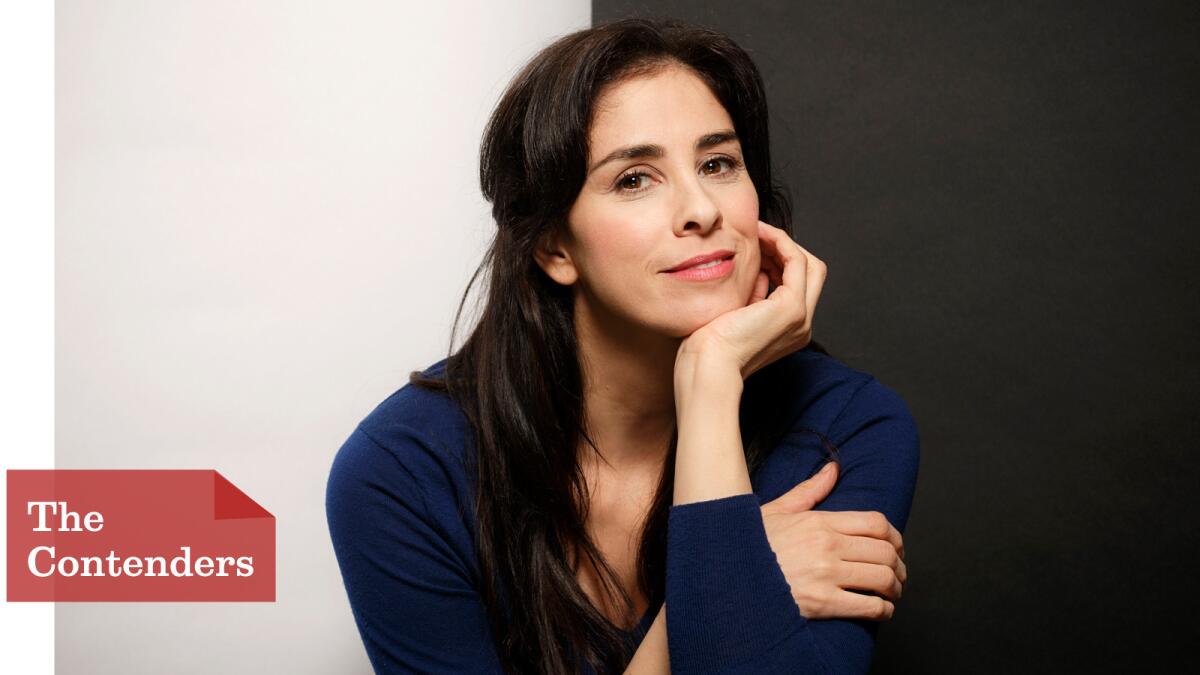The Envelope: Comedian Sarah Silverman had plenty of drama to draw on for ‘I Smile Back’

Sarah Silverman dives deeply into drama in “I Smile Back.” “Comedy is very different from drama, but they share an adjacent wall,” she says.
- Share via
reporting from TORONTO — It’s a commonplace that comedians are driven by demons, but Sarah Silverman’s comedy has often been rooted in her apparent lack of a dark side: Her stand-up mixes Barbie dolls and Klaus Barbie, and she once joked that being raped by a doctor “is so bittersweet for a Jewish girl.” But her 2010 memoir “The Bedwetter” revealed that she struggled with that condition well into her teens, and has spoken frequently about how she deals with clinical depression. That’s not to say that “I Smile Back,” in which she plays Laney, a suburban mother of two who self-medicates with cocaine and self-destructive sex, isn’t a departure, but it’s one that seems to bring Silverman back to herself rather than further away. At the Toronto International Film Festival, Silverman talked to The Envelope about the “full-body panic” of taking on the part, and how she prepared for it by doing as little as possible.
SIGN UP for the free Indie Focus movies newsletter >>
You’ve been playing more dramatic roles in recent years, on “Masters of Sex” and in “Take This Waltz,” but when novelist Amy Koppelman first approached you with “I Smile Back” seven years ago, you’d never done anything like it. Were you surprised they came to you?
Yeah! It was lovely to have someone be able to imagine me as something they haven’t already seen me do. But, honestly, it never occurred to me it would get made. A couple years later, I got an email saying, “It’s happening, we got the funding.” I replied-all and wrote “Yay!” and then I found myself slowly collapsing on the bathroom floor in a full-body panic attack, thinking, “What have I done? I can’t do this.”
How did you convince yourself you could do it?
I just told myself, “That doesn’t mean it’s not gonna be fun. Between ‘action’ and ‘cut’ it will be bleak, but I’m sure there’ll be a lot of laughs.” I’m so glad that I didn’t know then that would not be the case. It was an amazing experience but I would not describe it as fun.
It’s a much bigger role than you’ve played on screen before, in addition to being more dramatic. How did you prepare for that?
I did the bare bones. I read it; I was familiar with it. I learned my lines each day and had a general idea of what the plan was, with an expectation to abandon it completely. But I didn’t want to do what Laney does, which is to be in a big what-if spiral. The way I was able to survive through it was to just take each thing we were doing separately, which is how I deal with everything. I only look at what’s right in front of me, and I don’t think about anything else. My boyfriend is Michael Sheen, and he’s this amazing actor. He’s the real deal. I remember when I went to do it, he said, “Are you prepared?” I said, “Not as far as you’re concerned, but I think as far as I’m concerned, I’ve done what I’m going to do.”
The first time we see your character, she’s sitting in the bathroom while her children play outside, and she’s completely disassociated from their joy. You’re such an animated person, it’s a shock to see your face so still, almost blank.
Most comics, and a lot of actors, they travel with their bag of tricks. They depend on it, and they usually, not at all consciously, reach for it. I’m no exception, but I was very lucky to be surrounded by Amy and Paige [Dylan] and the director, Adam Salky, who were very aware of stripping me of any of that stuff. I remember a director awhile ago telling me, “No one’s ever going to cast you in anything real, because you’re a personality, and people can’t get lost in you.” I felt such despair from that because I really understood what he was saying.... But to get to be seen and to have a chance like this, it was neat.
In comedies, you’re often playing a persona more than a person. Do you end up putting more of yourself into someone like Laney?
They’re just different parts of me that aren’t usually the ones you see. Comedy is very different from drama, but they share an adjacent wall, and comedians in general tend to come from a lot of darkness in their lives. I mean, look at us, we drop like flies. So depression was a source for me, that was easily accessed. And addiction isn’t something I’ve suffered from, but I am surrounded by it as a comedian. Even though it’s a very different role, I had a lot to draw on.
More to Read
From the Oscars to the Emmys.
Get the Envelope newsletter for exclusive awards season coverage, behind-the-scenes stories from the Envelope podcast and columnist Glenn Whipp’s must-read analysis.
You may occasionally receive promotional content from the Los Angeles Times.










